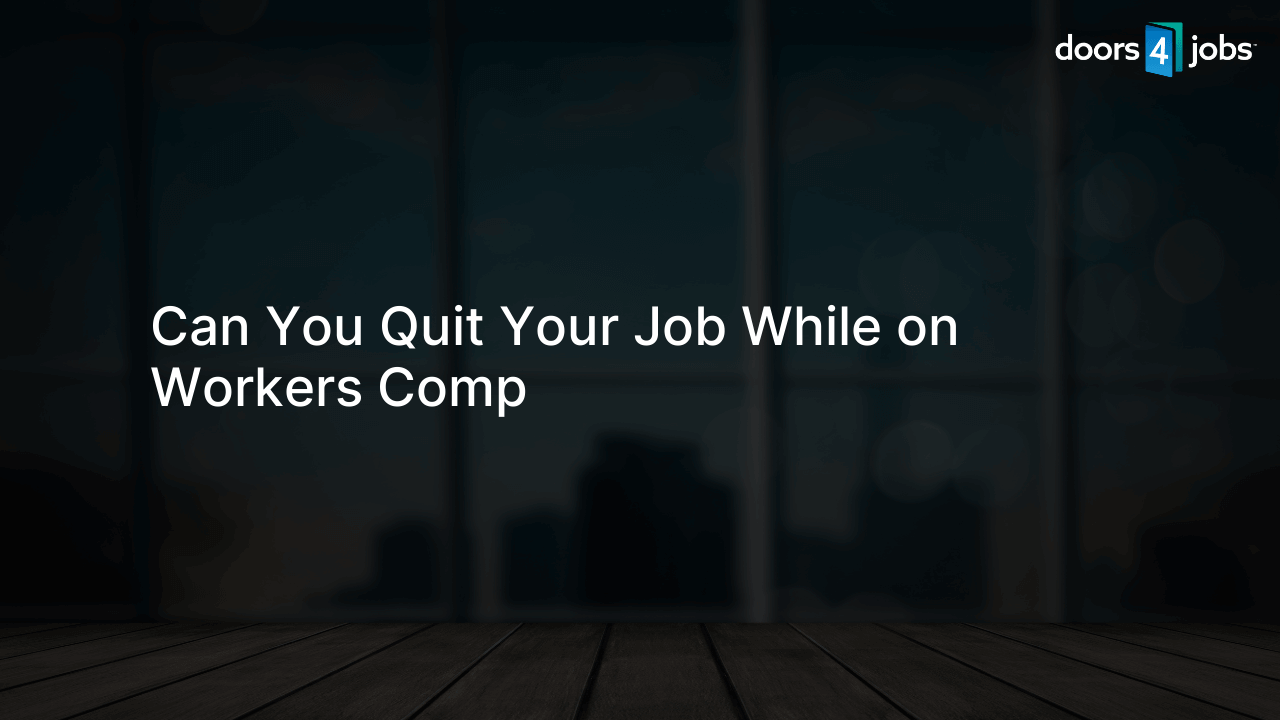Yes, you can quit your job while on workers’ comp, but it may affect your benefits, depending on the circumstances and laws in your jurisdiction. Consult with an attorney and notify your employer before taking any action.
Quitting Your Job While on Workers’ Comp
Quitting your job while receiving workers’ compensation benefits can be a complex decision, as it may have implications on your eligibility for benefits. In this blog post, we’ll delve into the factors you need to consider before making the decision.
Understanding Workers’ Compensation Benefits
Workers’ compensation is an insurance program that provides financial support and medical coverage to employees who have been injured or become ill as a result of their job duties. Benefits usually include medical care, lost wages, vocational rehabilitation, and, in some cases, permanent disability payments.
Impact on Medical Benefits
If you quit your job while on workers’ comp, it’s important to know that your medical benefits may still be covered, as long as the injury was sustained during your employment and you continue to require treatment. However, it’s essential to consult with an attorney and understand your specific jurisdiction’s laws, as they may vary from one place to another.
Lost Wage Benefits and Vocational Rehabilitation
Quitting your job may have a more significant impact on benefits such as lost wages and vocational rehabilitation. Depending on your case’s specifics, you could jeopardize your eligibility for these benefits if you quit your job voluntarily without any justifiable reason. If you resign due to work-related reasons, such as harassment or a lack of accommodations for your injury, you might be able to retain your benefits if you can prove the work-related issues forced you to quit.
Seeking Legal Advice
Before making the decision to quit your job while on workers’ comp, seeking legal advice from an experienced attorney is crucial. An attorney can evaluate your situation, inform you about your specific jurisdiction’s laws, and help you understand your rights and obligations.
Notifying Your Employer
If you decide to quit your job, it’s essential to notify your employer in writing, outlining the reasons for your resignation. This documentation can be valuable in case your workers’ comp benefits are challenged down the line.
Finding New Employment
Should you find a new job after quitting while on workers’ comp, ensure you inform both your workers’ compensation adjuster and your attorney. Securing new employment may affect your entitlement to lost wage benefits, so it’s important to be transparent about the changes in your circumstances.
Reasons for Quitting While on Workers’ Comp
Individuals may consider quitting their job while on workers’ compensation for various reasons, such as dissatisfaction with the work environment, conflicts with colleagues, personal health concerns, an inability to return to the same job, or an opportunity for new employment. Each case differs, and it’s essential to weigh all factors before making the decision to resign.
Consulting with Healthcare Providers
In addition to seeking legal advice, it’s crucial to consult with your healthcare providers, ensuring you have a clear understanding of your medical situation and progress before quitting. Be aware that you may need ongoing medical treatment and support even after resigning from your job. Keep your doctors informed of your plans, and discuss any potential repercussions on your health or treatment plan.
Alternative Options to Quitting
Quitting your job is not the only solution when dealing with work-related issues while on workers’ comp. Explore alternative options before making the decision to quit. Some alternatives include:
- Discussing your concerns with your employer and exploring potential accommodations or adjustments to your work environment.
- Requesting a modified or lighter duty assignment that accommodates your medical restrictions, if permitted by your doctor.
- Seeking mediation or a dispute resolution process if your concerns involve conflicts with coworkers or management.
Monitoring Changes in Workers’ Compensation Laws
Keep in mind that workers’ compensation laws may change over time, and it’s important to keep yourself updated on such changes. Any alterations in the law could affect your rights, benefits, or workplace responsibilities after quitting your job. Regularly consult with your attorney to ensure you’re aware of any relevant legal updates.
Resigning vs. Being Fired or Laid Off
If you’re considering quitting because you believe your employer might terminate your employment, discuss the situation with your attorney first. Being fired or laid off while on workers’ comp might entitle you to additional benefits or unemployment compensation, which you wouldn’t receive if you voluntarily resigned.
FAQ Section: Quitting Your Job While on Workers’ Comp
Are you considering quitting your job while on workers’ compensation? We’ve compiled answers to some frequently asked questions (FAQs) to help guide you through the process and implications of your decision.
Can quitting your job while on workers’ comp affect your medical benefits?
Quitting your job could potentially affect your workers’ comp medical benefits. However, in most cases, your medical benefits will still be covered as long as the injury occurred during your employment and treatment is ongoing. It’s essential to consult an attorney to understand your specific jurisdiction’s laws.
Will quitting your job affect your lost wage benefits or vocational rehabilitation?
Quitting your job may impact lost wage benefits or vocational rehabilitation, depending on the circumstances. If you voluntarily quit without a justifiable work-related reason, you could jeopardize your eligibility for these benefits. Consult with your attorney to evaluate your situation.
How should you notify your employer if you decide to quit?
If you decide to quit your job, you should notify your employer in writing, outlining the reasons for your resignation. This documentation can be crucial in case your workers’ comp benefits are challenged in the future.
What alternative options can you consider instead of quitting?
Before quitting, consider alternative options such as discussing your concerns with your employer, requesting a modified duty assignment, or seeking mediation or dispute resolution if your concerns involve conflicts with coworkers or management.
How does resigning differ from being fired or laid off while on workers’ comp?
Being fired or laid off while on workers’ comp can entitle you to additional benefits or unemployment compensation, which you wouldn’t receive if you voluntarily resigned. Discuss your situation with your attorney before making a decision.











